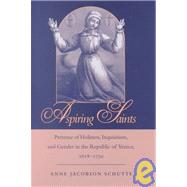Aspiring Saints
, by Schutte, Anne Jacobson- ISBN: 9780801865480 | 0801865484
- Cover: Hardcover
- Copyright: 4/19/2001
Between 1618 and 1750, sixteen people--nine women and seven men--were brought to the attention of the ecclesiastical authorities in Venice because they were reporting visions, revelations, and special privileges from heaven. All were investigated, and most were put on trial by the Holy Office of the Inquisition on a charge of heresy under various rubrics that might be translated as "pretense of holiness." Anne Jacobson Schutte looks closely at the institutional, cultural, and religious contexts that gave rise to the phenomenon of visionaries in Venice. To explain the worldview of the prosecutors as well as the prosecuted, Schutte examines inquisitorial trial dossiers, theological manuals, spiritual treatises, and medical works that shaped early modern Italians' understanding of the differences between orthodox Catholic belief and heresy. In particular, she demonstrates that socially constructed assumptions about males and females affected how the Inquisition treated the accused parties. The women charged with heresy were non-elites who generally claimed to experience ecstatic visions and receive messages; the men were usually clergy who responded to these women without claiming any supernatural experience themselves. Because they "should have known better," the men were judged more harshly by authorities. Placing the events in a context larger than just the inquisitorial process, Aspiring Saints sheds new light on the history of religion, the dynamics of gender relations, and the ambiguous boundary between sincerity and pretense in early modern Italy.






